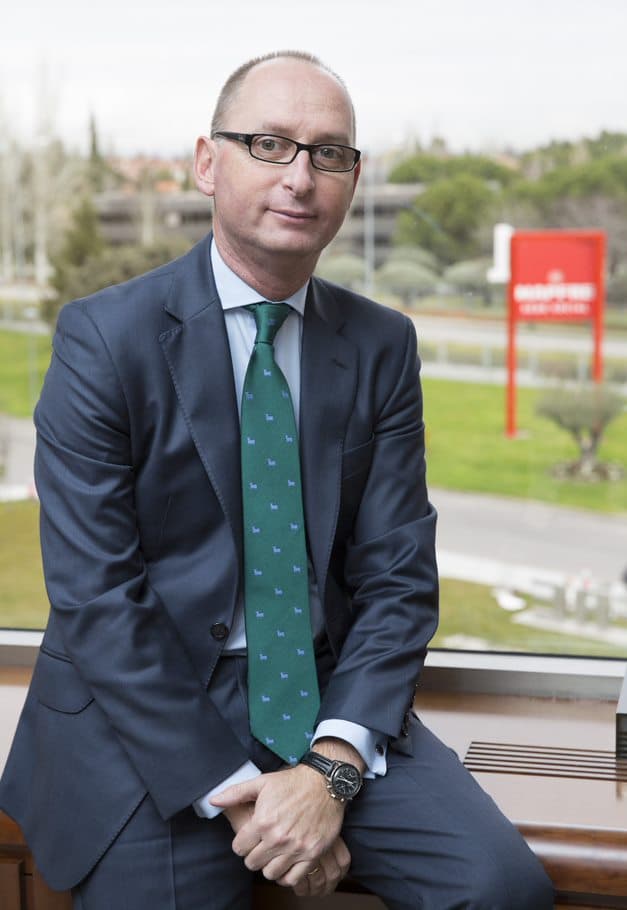"The asset management sector has indirectly benefited from the pandemic"

Redacción Mapfre
Sustainability has been part of MAPFRE's DNA for more than half a century and, inevitably, that commitment has gradually shifted to investment in recent years. José Luis Jiménez, Group Chief Investment Officer, has been one of the main drivers of this investment strategy Socially responsible investment has been a key theme since his arrival in September 2015 and now MAPFRE AM—Spain's largest independent asset manager and active in 25 countries—is a benchmark in this field. The CIO explains how the pandemic has accelerated the need to look not only at financial profitability, but also at social profitability.
Question: We are approaching the middle of the year. How does the asset management sector look after 2020, a year marked by the worst of the pandemic?
Answer: The truth is that INVERCO data (which state that mutual funds account for 14.8 percent of financial savings for families) indicate that it is one of the few sectors that have indirectly benefitted. As any economics guide will say, uncertainty triggers savings. With negative interest rates, where deposits offer no return, mutual funds have been accumulating those additional savings to turn them into investment. In addition, the significant adjustment last March gave rise to significant investment opportunities.
What concrete behavior is MAPFRE AM seeing?
The result is quite positive. Our focus on value investment, coupled with the philosophy of responsible investment, has enabled us to close the year with exceptional figures, despite the doubts that arose in the first quarters. Our European stock exchange investment strategies have given returns of between 10 percent and 27 percent, compared to -6 percent for the main European index. The more conservative strategies for savers have also seen extraordinary results with returns of between +1 percent and +5 percent. Increasingly more end investors and institutional investors want to invest with us, in the same assets we invest in. Moreover, it is not just a matter of profitability, but rather of doing the right thing, to help society with our investments as well.
The pandemic has accelerated the trend for ESG criteria and socially responsible investment. How do you apply this concept at MAPFRE AM?
A. Sustainability has indeed been boosted. MAPFRE's commitment to sustainability through Socially Responsible Investment (SRI) is long standing. As early as 1965, the Company bylaws formalized the fact that as well as generating profit, the company must also assume social responsibility.

Was MAPFRE AM ready to implement the new European regulation on this matter?
We have been working on the matter for many years and have been able to adapt to the new regulation. The new Sustainable Finance Disclosure Regulation (SFDR), with measures such as a common taxonomy and the creation of labels for green financial products, has meant a significant change in transparency and in improving accessibility to investors who want to invest responsibly in these assets.
What implications does this regulation have for clients?
An unwanted phenomenon has grown alongside the rise of SRI: greenwashing or making something that is not sustainable seem like it is. This is why it is important that the client or investor is aware of the companies in which they are actually investing their money. For example, the world's largest Sustainable ETF invests mainly in real estate and other alternative assets. We have a number of SRI products that, in addition to generating profitability, have a positive effect on society. For example, MAPFRE AM Capital responsible, which has recently exceeded 120 million in equity, is available as both a mutual fund and pension plan, and MAPFRE AM Inclusión Responsible is the first fund to prioritize investment in companies that are committed to including people with disabilities in the workplace.
You have just launched a new website. What is the goal here?
MAPFRE AM is the main investment arm of the MAPFRE Group. Over its 30+ years of history, it has grown to operate in 25 counties and manage more than 40 billion of the 50 billion under the group's management. It is the biggest Spanish independent manager, with more than twice the assets of its closest competitor, and it has a history of co-investment with our clients. We offer investors the chance to invest in the same assets we invest in ourselves, aligning interests and always with a very conservative perspective, as the top Spanish insurance group. In addition, we are currently internationalizing our business (through alliances with the best international partners) and our products (such as through the growth experienced by our SICAV in Luxembourg, which has more than 1.2 billion in equity and was recently registered in the UK. We therefore needed a website that serves as a business card for our investors, who are mainly institutional.
I have taken a look and you highlight new alliances with key national and international partners. Could you tell us about these agreements?
In fact, in recent years, we have grown through various alliances. In 2017, we acquired a 25 percent stake in La Financière Responsable (LFR), a boutique company with several decades of experience in the field of SRI. More recently, at the end of 2019, we reached an agreement with the Boyar Value Group in the US, as a result of which we have just launched MAPFRE AM Forgotten Value, a fund that is having a spectacular year with double-digit returns. Progress is also being made in the private banking business with the acquisition of a stake in Abante Asesores, the main independent equity manager in the Spanish market.



